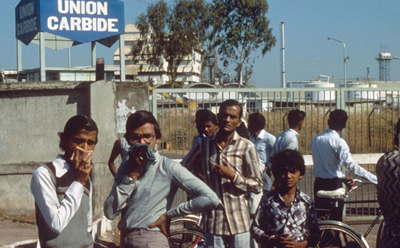How Can UCC, an American Corporation, be Subject to Indian Jurisdiction?
How Can the Union Carbide Corporation, an American Corporation, be Subject to Indian Jurisdiction?
Counsel for UCC claim that the US corporation is not subject to the jurisdiction of Indian courts on the grounds that section 20 of the Indian Penal Code limits punishment to acts or omissions committed "within India". UCC's lawyers further argue that India's extraterritorial jurisdiction does not reach the US corporation as section 4 of the Penal Code limits such jurisdiction to offences committed by any Indian citizen outside India or any person on, a ship or aircraft registered in India.
However, under international law, a state may exercise criminal jurisdiction over a foreign national for acts committed outside its territory which have an effect within its territory. Under this "detrimental effects" view of the territorial principle of criminal jurisdiction, a foreign national is considered "constructively present" within the state in which the offence took effect. In light of the detrimental effects interpretation of criminal jurisdiction under international law, any acts or omissions committed by UCC in the US which caused the Bhopal gas leak disaster must be considered to have occurred within India for the purposes of section 2 of the penal code.
The leak of toxic gas at the heart of the Bhopal tragedy was caused by the ingress of water, through a temporary bypass pipe, into a methylisocyanate (MlC) storage tank which provoked an exothermic chemical reaction that, in turn, forced the MIC gas out of the tank. The bypass pipe was installed, with the approval of UCC, due to the closure for repairs of the flare tower (a safety system which burnt excess gas). Therefore, the UCC's approval of the installation of a stop-gap measure which, by joining two previously unconnected parts of the system created the risk of leakage into the MIC tank, must be one cause of the accident.
Furthermore, the 1982 UCC safety audit of the Bhopal plant reveals that the US corporation had knowledge of the inadequate maintenance of safety systems at Bhopal but failed to adequately warn or make safe the dangerous condition. The 1982 report cited the following defects in vital safety equipment: vent pipelines requiring six-month replacements in use for over two years; pressure gauges in the Control Panel faulty; the motor used to pump caustic soda into the vent scrubbers was not functional; and the pipeline interlinking the vent scrubbers to the flare tower was under repair.
Despite the warning provided by the 1982 report, the following essential safety items were not operational on the date of the accident: vent gas scrubber which neutralises escaping gas by passing it through a caustic soda solution; the flare tower which burns off escaping gases; and refrigeration unit designed to inhibit chemical reactions. Furthermore, although one MIC storage tank was supposed to remain empty to accept any escape in gases, the overflow tank contained more than one ton of MIC. Therefore, the US corporation’s failure to maintain the safety systems, despite its knowledge of the defective condition, is also a cause of the accident.
The facts of the Bhopal case reveal that the acts and omissions of UCC in the US bear direct causal relationship to the gas leak. In light of the fact that, under international law, an accused is deemed constructively present in the state in which his acts, although committed outside the state, have an effect, the acts and omissions of UCC relating to the Bhopal tragedy must be considered within India for purposes of Section 2 of the Indian penal code. Failure to so interpret the code would render it dead letter law observed only in its breach.


